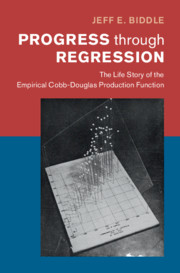Book contents
- Progress through Regression
- Historical Perspectives On Modern Economics
- Progress through Regression
- Copyright page
- Dedication
- Contents
- Figures
- Acknowledgments
- Introduction
- Part I Paul Douglas and His Regression, 1927–1948
- Part II The Diffusion of the Cobb–Douglas Regression
- Part III Conclusion
- 7 On the Success of the Cobb–Douglas Regression
- References
- Index
- Historical Perspectives On Modern Economics
7 - On the Success of the Cobb–Douglas Regression
from Part III - Conclusion
Published online by Cambridge University Press: 30 October 2020
- Progress through Regression
- Historical Perspectives On Modern Economics
- Progress through Regression
- Copyright page
- Dedication
- Contents
- Figures
- Acknowledgments
- Introduction
- Part I Paul Douglas and His Regression, 1927–1948
- Part II The Diffusion of the Cobb–Douglas Regression
- Part III Conclusion
- 7 On the Success of the Cobb–Douglas Regression
- References
- Index
- Historical Perspectives On Modern Economics
Summary
This chapter presents speculation regarding factors that contributed to the success of the Cobb–Douglas regression. I discuss in particular four factors that helped facilitate the widespread adoption of the regression approach to production function estimation. (i) Douglas’s decision to link his procedure to fundamental concepts of the neoclassical approach to economics, which was destined to grow in influence over the course of the twentieth century. (ii) the flexibility and adaptability of the technique. (iii) Douglas’s rhetoric of persuasion, and (iv) the emergence of prominent advocates for the technique, such as Earl Heady and Zvi Griliches who communicated, by words and example, the attitude that despite its weaknesses, the technique was potentially very valuable, that the best way to realize that potential was to continue using the technique while working to address the weaknesses, and that even while this process of improvement was going on, the technique was still able to contribute to knowledge. The question of why such allies emerge is explored.
Keywords
- Type
- Chapter
- Information
- Progress through RegressionThe Life Story of the Empirical Cobb-Douglas Production Function, pp. 299 - 314Publisher: Cambridge University PressPrint publication year: 2020

